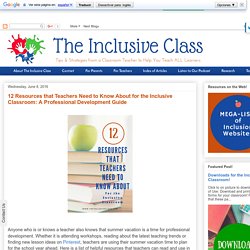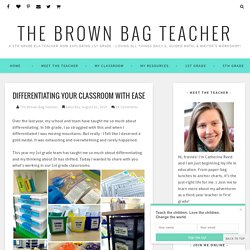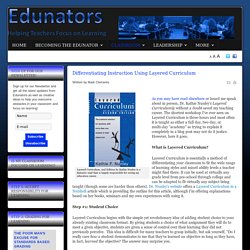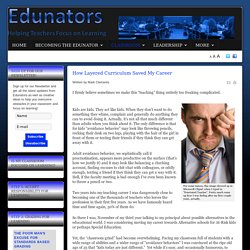

K1CombosCPolitanoUVIC0710. 12 Resources that Teachers Need to Know About for the Inclusive Classroom: A Professional Development Guide. Anyone who is or knows a teacher also knows that summer vacation is a time for professional development.

Whether it is attending workshops, reading about the latest teaching trends or finding new lesson ideas on Pinterest, teachers are using their summer vacation time to plan for the school year ahead. Here is a list of helpful resources that teachers can read and use in the inclusive classroom: Authors, Jennifer Kurth and Megan Gross, provide a comprehensive resource for inclusive education in this essential resource! Full of research-based strategies, tools, and practical advice on inclusive education. Differentiating Your Classroom with Ease - The Brown Bag Teacher. For me, differentiating no longer means creating separate games/activities/learning targets.

It doesn't mean that some students do more work or students are being taught different content. It does mean tweaking activities, so they have the just-right scaffolds and pushes for my students. To me - right now - differentiation means... Believing these things, our team has developed structures and organization to help us be intentional in our planning.
Today I'm sharing some ideas, resources, and specific examples that have worked in my classroom. Creative drama differentiated instruction. Carol Tomlinson. Differentiated instruction. Differentiated instruction and assessment (also known as differentiated learning or, in education, simply, differentiation) is a framework or philosophy for effective teaching that involves providing different students with different avenues to learning (often in the same classroom) in terms of: acquiring content; processing, constructing, or making sense of ideas; and developing teaching materials and assessment measures so that all students within a classroom can learn effectively, regardless of differences in ability.[1] Students vary in culture, socioeconomic status, language, gender, motivation, ability/disability, personal interests and more, and teachers must be aware of these varieties as they plan curriculum.

Brain-based learning[edit] Differentiation is rooted and supported by literature and research about the brain. As Wolfe (2001) argues, information is acquired through the five senses: sight, smell, taste, touch and sound. Pre-assessment[edit] Ongoing assessment[edit] Learning Styles Inventory. Why is your homework not done. Inclusive Education. Dr. Kathie Nunley's Layered Curriculum Web Site for Educators. Differentiating Instruction Using Layered Curriculum.
Details Written by Mark Clements Layered Curriculum, 2nd Edition by Kathie Nunley is a fantastic read that is largely responsible for saving my education career.

As you may have read elsewhere or heard me speak about in person, Dr. Kathie Nunley’s Layered Curriculum® without a doubt saved my teaching career. How Layered Curriculum Saved My Career. Details Written by Mark Clements I firmly believe sometimes we make this “teaching” thing entirely too freaking complicated.

For some reason, this image showed up in Microsoft Clipart when I typed in "Frustrated Teacher". Pretty much sums up how I was feeling after my first couple years, actually. Kids are kids. What Works Clearinghouse - Addressing Challenges.